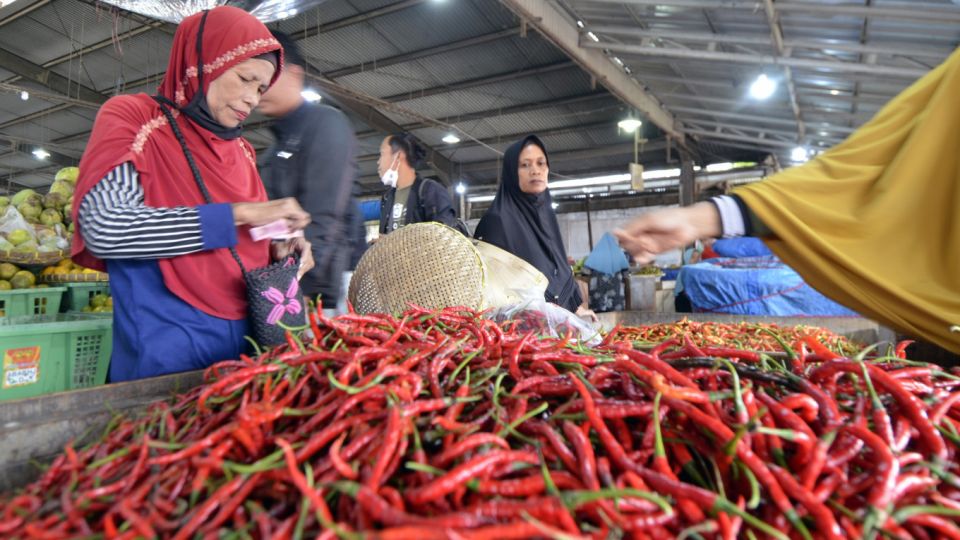September 19, 2022
JAKARTA – After months of pursuing various ways to tame inflation, the central government is calling on the regions to do their bit to alleviate rising pressure on consumer prices.
In a meeting with regional leaders from the provincial to the regency level, President Joko “Jokowi” Widodo appealed for their cooperation in combating the impact of the recent fuel price hike and using their budget funds to assist the central government.
Although inflation cooled slightly in August, experts have warned that the recent decision by the government to increase the prices of subsidized fuels and some unsubsidized fuels would add to inflationary pressure in the coming months.
The state budget allocation earmarked for energy subsidies and compensation was increased several times this year as expected demand of the subsidized gasoline brand Pertalite and diesel brand Solar outstripped budgeted supply.
“Because of the fuel price hike, I see the impact on inflation […], and this is something we do not want. So, I ask […] for the regions to cooperate, cooperate like when we worked simultaneously to overcome COVID-19,” the President said on Monday.
The President stated that the Finance Ministry and Home Ministry had issued regulations allowing for 2 percent of the general transfer funds (DTU) – which comprise revenue-sharing funds (DBH) and general allocation funds (DAU) – to be used to soften the blow of the fuel price hikes.
He left the policy tools up to the respective leaders but did recommend subsidies for some groups impacted by the fuel price hike, such as a Solar fuel subsidy for fisherfolk and raw materials subsidies for micro, small and medium enterprises.
Aside from the DTU, the President also suggested that regional leaders utilize contingency budget allocations (BTT) to subsidize transportation for businesses or directly purchase goods from producers to be delivered to markets.
‘One word: inflation’
“If a region experiences an increase in prices of goods and services and the regional head is silent, it means he does not understand what inflation is and what consequences it has for the people. Mind this one word: inflation,” the President warned.
As regional budgets were paramount for each region’s economic growth, the President continued, more spending efforts were needed, as so far only 47 percent of planned spending had been realized.
After a meeting with the President on Tuesday, Finance Minister Sri Mulyani said there was still a lot of room for regional leaders to utilize the leniency provided, as there were still Rp 9.5 trillion (US$634 million) and Rp 2.7 trillion of unused BTT and DTU funds, respectively.
“We will provide incentives for local governments that can push inflation below the national level […] and are likely to give around Rp 10 billion to the ten [administrations] at each the provincial, city and district level [that achieve the lowest inflation],” she told reporters.
Tackling inflation head-on
Sri Mulyani said on Monday that the government was on track to tackle the source of supply problems head-on instead of “tinkering” with macroeconomic policies, though noting that a macroprudential framework was maintained.
Coordinating Economic Minister Airlangga Hartarto said on Wednesday that regional leaders were expected to understand the sources of their food supply so ensure smoother logistics and synchronization between regions.
Airlangga said stocks of cayenne pepper, large chili and shallots remained ‘vulnerable’ and instructed the National Food Agency (BPN) to set up a hotline to resolve possible shortages.
“What we can control, we must control, namely administered prices and food prices […] This war of ours is real, and the BPN was formed to wage war on food inflation,” Airlangga continued.
After the meeting with the President, Central Java Governor Ganjar Pranowo said on Monday that he had at his disposal an estimated Rp 500 billion in BTT funds accumulated from 35 cities and regencies to curb inflation.
With that, in addition to new DTU funds, Ganjar said he planned to subsidize those impacted by the fuel price hike. Rp 17.9 billion would go to subsidize fares on province-owned buses, Rp 4.7 billion to fishing operations and Rp 905 million to raw material assistance for small and medium enterprises.
The next day, the provincial administration announced plans to add Rp 950 million for farming machine assistance, Rp 34 million in fuel subsidies for farm equipment and Rp 220 million in solar subsidies for rice milling firms.
“Our task now is to calculate in detail and ensure that all potential budgets that can be used to intervene are tapped,” Ganjar said on Monday.
Center of Economic and Law Studies (CELIOS) director Bhima Yudhistira told The Jakarta Post on Wednesday that while incentives for regional governments could push them to assist the central government, data exchange between regional governments was key to reducing price pressure.
He added that the reliability of data was paramount and recommended that regional leaders create a task force of their own to monitor daily prices at markets and survey farmers to keep tabs on rice stocks.


